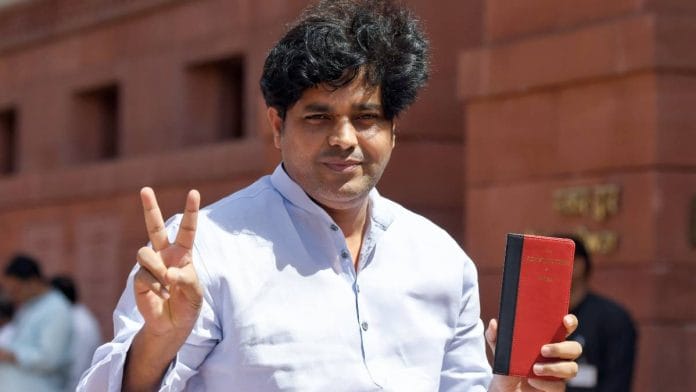New Delhi: Literature, including poetry and drama, films, stage shows such as stand-up comedy, satire and art make life more meaningful, the Supreme Court observed Friday while quashing an FIR against Rajya Sabha MP Imran Pratapgarhi over a “provocative” poem posted on social media.
In its 54-page landmark verdict, the bench of Justices Abhay S. Oka and Ujjal Bhuyan also noted that “75 years into our republic, we cannot be seen to be so shaky on our fundamentals that mere recital of a poem, or for that matter any form of art or entertainment, such as stand-up comedy, can be alleged to lead to animosity or hatred among different communities”.
Subscribing to such a view, the order further said, would “stifle all legitimate expressions of view in the public domain which is so fundamental to a free society”.
The ruling comes in the wake of the Kunal Kamra controversy, in which the standup comedian is facing heat over his jokes on Maharashtra Deputy Chief Minister Eknath Shinde.
The Supreme Court also said Friday that in cases of cognisable offences which relate to the right to freedom of speech or the written or spoken word, it is “always appropriate to conduct a preliminary enquiry” to check the contents and see whether there exists a case, before proceeding with formal legal action against the accused.
This, in turn, will ensure that the fundamental rights under Article 19 of the Constitution remain protected, it said.
Congress MP Pratapgarhi was booked by the police in January for posting on social media a 46-second video and poem following a mass marriage programme in Jamnagar, Gujarat, under Sections 196 and 197 of the Bharatiya Nyaya Sanhita (BNS), which relate to promoting enmity between different groups and making statements prejudicial to national integrity.
The Gujarat High Court had on 17 January rejected Pratapgarhi’s plea seeking to quash the FIR against him, after which he approached the Supreme Court which has now provided him relief, noting that the Urdu poem has nothing to do with any religion, community, region or race.
“By no stretch of imagination, the contents affect national integration,” the court said, adding that the poem does not jeopardise the sovereignty, unity, integrity or security of India.
Court observations
In its Friday ruling, the court made the following observations as it quashed the FIR against the MP.
Firstly, it drew attention to Section 173(3) of the BNS, which provides that the in-charge of a police station should first conduct a preliminary probe in case he receives a complaint of a cognisable offence, punishable for three to seven years. This inquiry, which precedes registration of an FIR, must be subject to permission from the in-charge’s superior.
Subsequently, if the officer comes to the conclusion that a prima facie case exists, an FIR should immediately be registered, and they should proceed to investigate the matter. But, if he is of the view that a prima facie case is not made out to proceed, he should immediately inform the first informant/complainant so that he can avail of appropriate remedies, the court said.
Similarly, in cases where the offences relate to Article 19, or broadly spoken or written words, it is “always appropriate to conduct a preliminary inquiry” to check the contents and see whether there exists a case against the accused, the court advised.
Secondly, it said police officers must abide by the Constitution and its ideals. “Article 19(1)(a) confers a fundamental right on all citizens to freedom of speech and expression. The police machinery is a part of the State within the meaning of Article 12. Moreover, the police officers, being citizens, are bound to abide by the Constitution,” it added.
Thirdly, when an offence punishable under Section 196 of the BNS is alleged, the effect of the spoken or written words will have to be considered based on the standards of “reasonable, strong-minded, firm and courageous individuals” and not based on the standards of people with weak and oscillating minds, it ruled.
The effect of the spoken or written words cannot be judged based on the standards of people who always have a sense of insecurity or of those who always perceive criticism as a threat to their power or position, the court went on to elaborate.
Finally, the court said that without the freedom of expression of thoughts and views, it is impossible to lead a dignified life guaranteed under Article 21.
“In a healthy democracy, the views, opinions or thoughts expressed by an individual or group of individuals must be countered by expressing another point of view,” it added, noting that even if a large number of people dislike the views expressed by another, the right to express those views must be protected.
Criticising law enforcement agencies and the judiciary for their failure to understand the right to free speech, the court that reasonable restrictions on free speech must be reasonable and cannot be fanciful or oppressive.
The judgement serves as a reminder to courts and police about their constitutional duty to uphold and enforce rights.
Views must be protected, even if judges don’t like them. “We, judges, are also under an obligation to uphold the Constitution,” the apex court said.
It further said that when the police and executive fail to uphold free speech, it is the duty of courts to step in.
“There is no other institution which can uphold the fundamental rights of citizens. The courts, particularly the constitutional courts, must be at the forefront to zealously protect the fundamental rights of citizens,” it asserted.
(Edited by Nida Fatima Siddiqui)






